By Karen Johnson, former Library staff member and author of In search of beauty: Hilda Rix Nicholas' sketchbook art
Within the papers of Australian artist Hilda Rix Nicholas are dozens of letters written by her travelling companion Dorothy Richmond during their trip to Europe in 1924 to1926. The letters provide a vivid and entertaining firsthand account of their voyage, their everyday life in Paris and the many trips they undertook. In her letters, Dorothy writes of meeting the 1924 Australian Olympic team and their experience of attending the games as spectators. This blog explores these accounts and includes extracts of Dorothy’s writings.
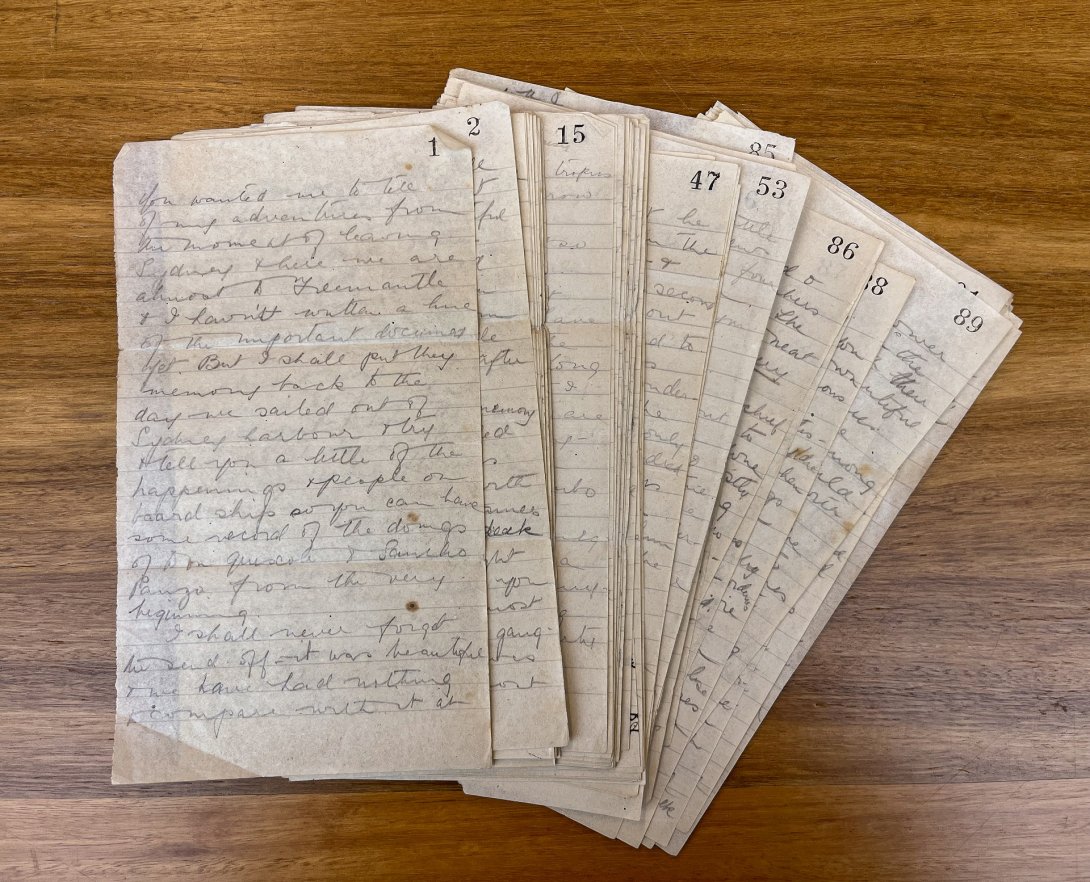
‘…with hands filled with rainbow-coloured streamers and leaning far over the deck rail to get a last sight of it all…’ so commenced the journey in April 1924 of Australian artist, Hilda Rix Nicholas, and her friend, Dorothy Richmond, as the SS Ormonde headed out of Sydney Harbour. It was the start of their voyage to Europe where Hilda was intending to spend an extended period of time painting and promoting her Australian art.
By coincidence, also onboard SS Ormonde was the Australian Olympic team, bound for the Paris Olympics in July of that year. The team comprised 35 men, with women being very poorly represented at the games, having only been permitted to compete for the first time in 1900. Of a total of 3,089 athletes at the Paris Olympics in 1924, only 135 were women.
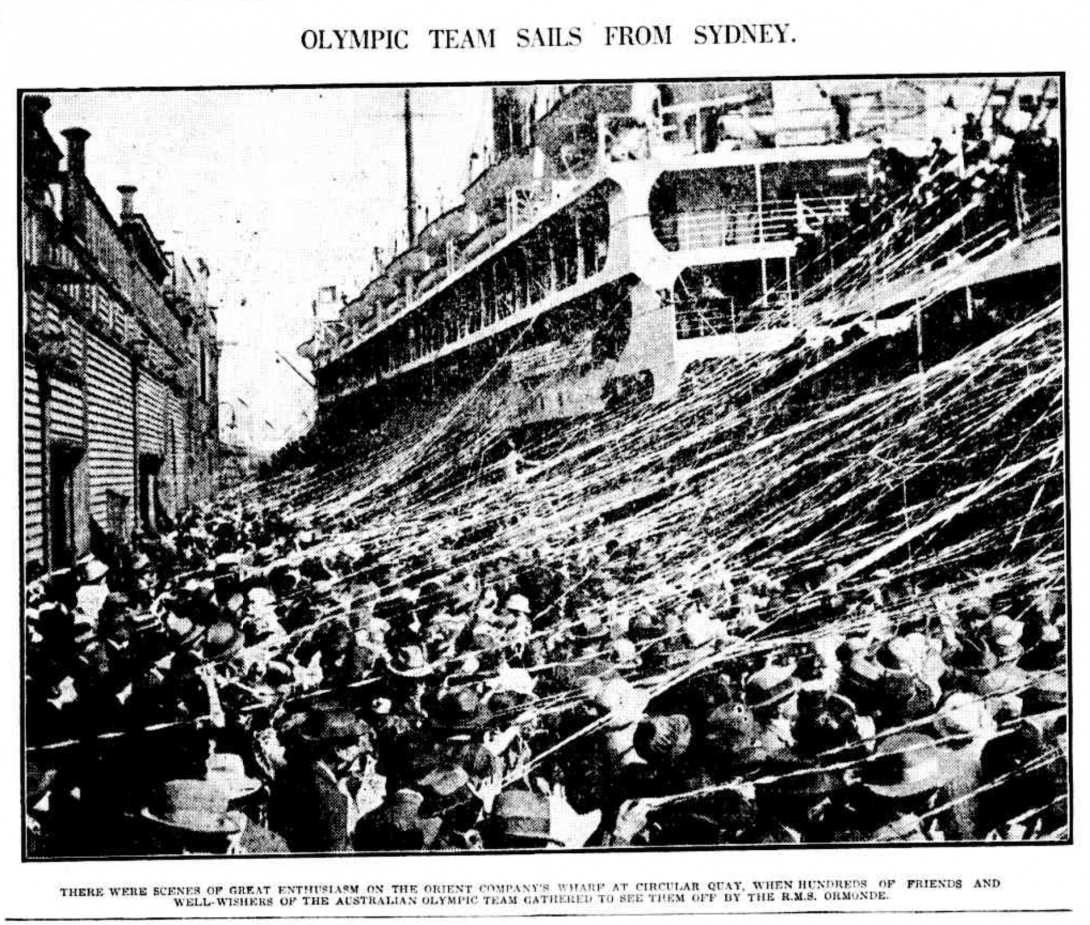
The athletes worked hard to maintain their training regime onboard during the six-week voyage as they were due to compete not long after their arrival in Paris, with no chance to acclimatize. Despite their exercise regime, many of the athletes were up for the fun that shipboard life offered, and Hilda and Dorothy became friends with several of the team. Activities such as deck games, fancy dress balls and visits to exotic ports along the way provided the opportunity to unwind and foster friendships.
The youngest athlete on the team at the age of 16 was swimmer Andrew ‘Boy’ Charlton, who was a great hope for success at the games. In early 1924, he had competed in Australia against the Swedish swimmer, Arne Borg, the holder of four world records. Watched by a packed crowd at the Domain Baths, Charlton won the 440-yard freestyle event by 20 yards, in a time that equaled Borg’s world record. Dorothy notes that they saw little of him onboard as he ‘tucks himself away in one of the lounges most evenings.’
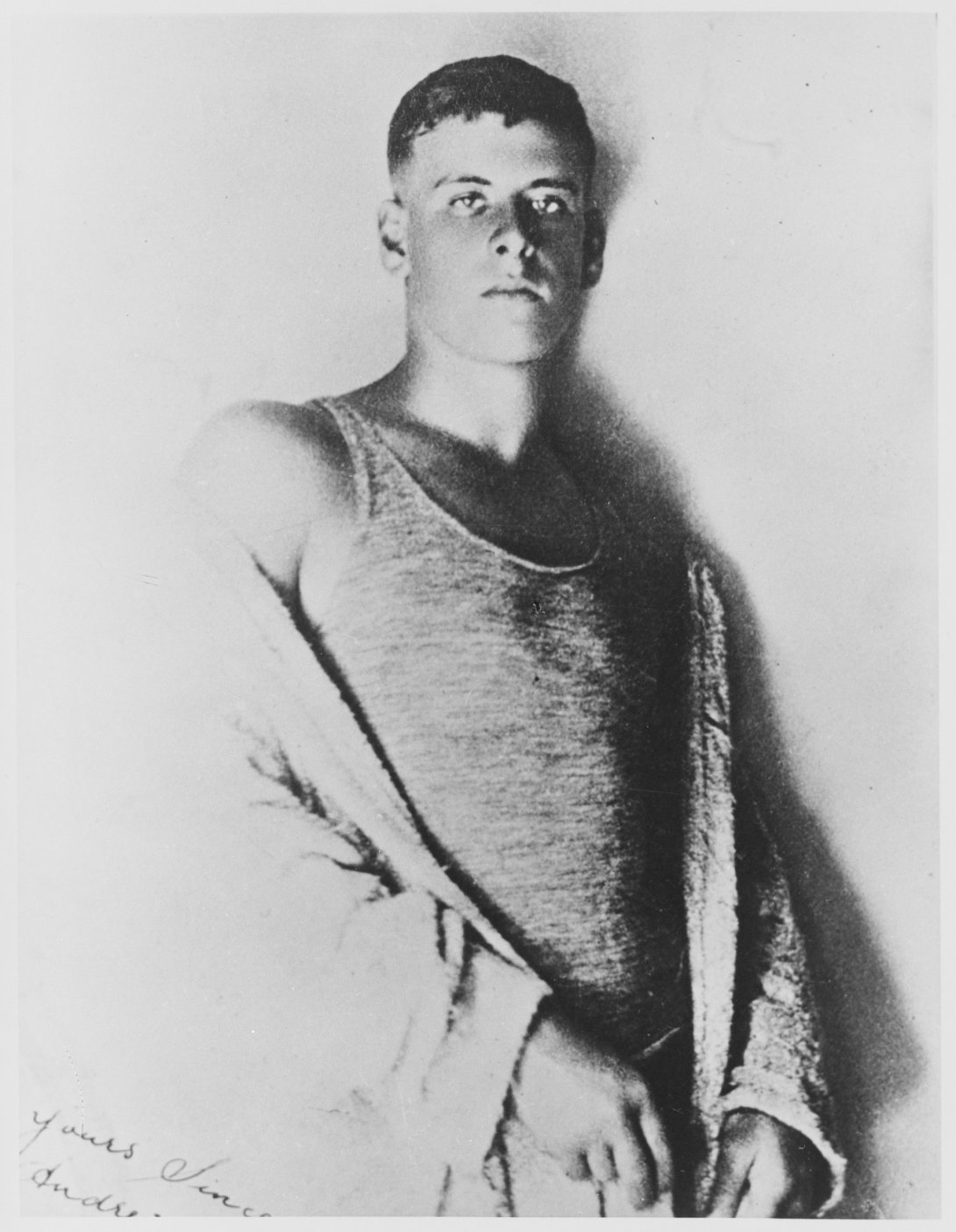
Accompanying Charlton onboard was his coach, Tim Adriann, who it eventuated had been suffering from 'shell shock', now known as post-traumatic stress disorder, as a result of his experiences in WWI. His health had been steadily deteriorating as the voyage progressed, and Dorothy recounts a tragic incident involving him throwing himself overboard.
It was a hot, stormy day and he thought the thunder was a big German gun, so with a ‘here goes’ he was over the railing before anyone could stop him. The excitement and strain were terrible – they threw life buoys over but couldn’t sight him. The great siren of the ship boomed, a sound to strike terror, and turned back on our tracks. It seemed an eternity before a boat was lowered – there was still no sign of the man. Then suddenly we saw him, just his head and feet sticking out of the water. He was swimming along quite happily, ignoring the belts and gradually we swung close to him. A great cheer went up from us all and he turned on his back and clapped and waved and laughed. He didn’t realise – he thought he was swimming in the Grand Marathon, and objected when the second boat was put out to save him and tried to swim away. It is so sad, but so wonderful his escape. The officers say that only one man in a hundred who goes overboard is not taken by sharks.
She reports that ‘Charlton felt it very much – it took four men to hold him from going in after him, and the poor boy broke down [and] wept bitterly when he was saved, for the strain had been terrible…’. With such drama to deal with, and having lost his coach, it did not bode well at this time for Charlton’s chances of success at the Olympics.
Hilda, Dorothy and the team disembarked at Toulon. Dorothy writes of her last day onboard
I seemed to have challenged deck games with half the Olympic team!! It was really a sad, glad day – I hated it being the last and it flew away far too quickly. In the evening, we danced until late, then watched the moon for a little while (quite safe!) – then straggled to the cabin to finish the last of our packing before climbing into our bunks.
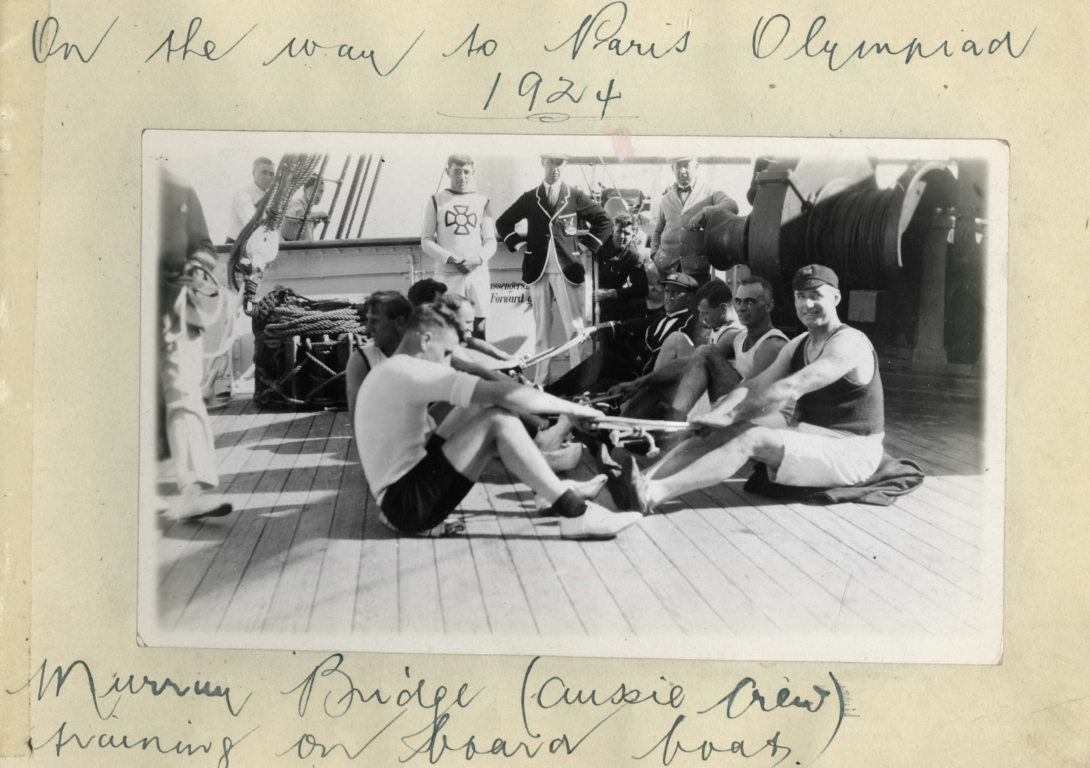
Dorothy and Hilda attended the opening ceremony of the games, which took place on 5 July, with 44 nations represented. They had bought new hats for the occasion feeling they had to’ ‘keep Australia’s end up’ since the Australian team comprised only 35 athletes compared to that of the 200 Americans. Dorothy recounts that Hilda ‘…threatens to make more noise than all the Americans, so if you hear a little faint ‘coo-ee’ in Australia this afternoon you will know it’s Hilda keeping her word.’ They made their way to their seats with thousands of other people of every nationality and found themselves seated not far from the French President and the Prince of Wales.
When the Australian team made its way into the arena, Hilda and Dorothy were:
…wild with excitement – they swung along well in step, heads up – chests out – till they were opposite. We waved our little flags and cheered with the others – only louder, and on they went till they came level with the President’s stand and then off came their caps. They took up their position facing us, but to the left. Some of the men knew just where we sat – they could see us, and they took off their caps and waved them at us when they took up their positions in the centre of the field. We waved our little flags and felt more important than the Prince of Wales.
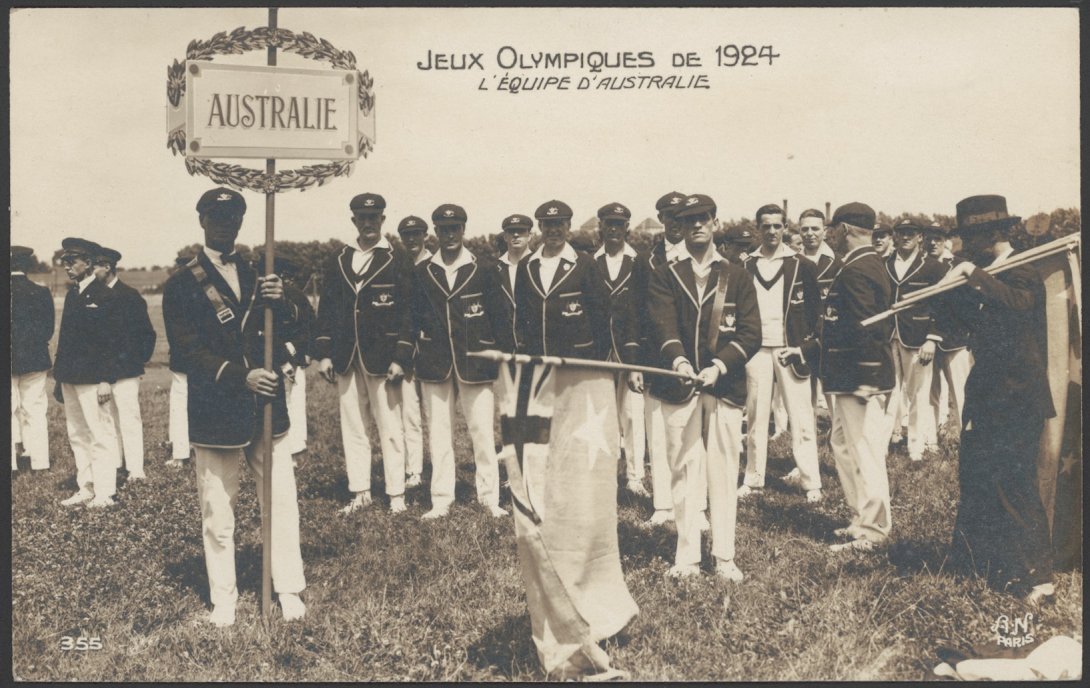
Once all the athletes were in the arena, the Opening Ceremony commenced.
…the standard bearers walked to the centre and there formed a semi-circle, and when the Olympic oath was given, they dipped the flag and every man raised his arm in token that he had taken it. Then the pigeons were let go and the guns fired a salute and aeroplanes whizzed back and forth taking photos and a big balloon went up, and there was general excitement – the Olympic games were opened!
No flame was lit, the first official Olympic Flame being lit in Amsterdam for the start of the 1928 Olympics. What a far cry from the spectacle and expense that can be expected of the 2024 Paris Olympic Games opening ceremony.
Because of the friendships they had forged, Hilda and Dorothy attended as many of the events as possible, lending their support to the little Australian contingent. Dorothy notes:
It is very difficult when you are in Australia to realise the odds they have up against them. The long boat trip, the lack of training and the few men we have to compete makes our chances very small.
Along with several of the Australian athletes, Hilda and Dorothy made sure they had good seats for the swimming event pitting ‘Boy’ Charlton against Arne Borg.
At last the time came and Borg marched out and was cheered – then came Charlton. Australian flags from every quarter of the Stadium fluttered – we coo-eed and cheered! It was Australia’s day – we let go. Then the pistol went, and all dived in to commence the swim of 30 lengths of the baths. Borg forged ahead the first length, then the second, then the distance between these two grew less…And so we yelled at each lap as Charlton made the distance greater and greater without any effort. We coo-eed, we shrieked – everyone made a terrible row. And the excitement got hotter and hotter – Borg kept falling back from Charlton, in spite of his tremendous endeavour… And so, the race went on till the last lap and then with a wonderful spurt of speed Charlton came to the winning post – Borg the length of the baths behind.
In what was a remarkable feat, given the lead up he had to the games, Charlton was to win one gold, one silver and one bronze medal at the games.
Overall, the Australian team came 11th at the games, winning three gold, one silver and two bronze medals.